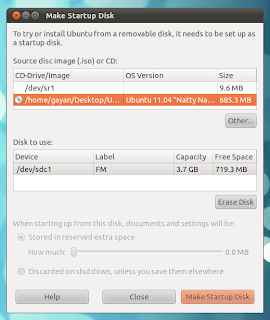Monday, February 6, 2017
How to Create a USB Bootable ISO image in Ubuntu
How to Create a USB Bootable ISO image in Ubuntu
Although the optical disk aint gonna be dead anytime sooner ;-) yet because of the popularity of netbooks or Tablet PC type electronic gadgets and when it comes to installing Ubuntu operating system in on them, USB devices (such as pen drives for instance) is the least expensive and sometimes the only way to perform the installation.
Even if you have an Optical drive, still trying a GNU/Linux liveCD on a USB drive is the best option in my opinion when compared with a original method of burning it into a CD/DVD because there are few advantages.
1. Theyre noiseless!:
Well, if you want the experience the best performance while trying the LiveCD and if youre burning a CD/DVD, then you should go for the maximum amount of Burning speed so the LiveCD/DVD will be able to perform tasks in a much speedier way.
But thatll also make it a bit noisy, dont you think?. But a USB drive is noiseless!.
2. Faster than CD/DVDs (most of the time):
Unless you have a bit older USB stick/pen-drive, most never pen drives have really higher MB output thus youll be experiencing a much more faster LiveCD "experience" in comparison with the CD/DVD method. Although not at its best, this will also help you to get a better idea of the actual (close) performance of the OS it self.
But as said, this might not always be the case since SATA or SSD drives are a hell lot faster than most of the USB drives nonetheless :).
Anyhow, in that sense, if you have already installed Ubuntu in your Netbook for instance, but wondering how to create/burn the recently downloaded never version of the Ubuntu ISO image into your USB disk... did you know that Ubuntu comes pre-installed an application called "Usb-Creator" (which is basically a GTK front-end that uses the "usb-creator" command-line tool) that lets us does exactly that!.
Main features...

*. As said, its a default app thus if youre running a never version of Ubuntu, this you dont have to manually install it (comes pre-installed in Ubuntu 8.10 and above).
*. Lets you burn Ubuntu ISO images to any USB media. Although Im not sure but you might also be able to use a different GNU/Linux (other than Ubuntu) with it too... but not sure though.
*. Save your documents: Unlike with a LiveCD, with a USB disk, by using this tools we can manually assign how much of MB to be reserved for saving our documents that we create while using the Live Ubuntu OS which we can retract at a later time. Again this is impossible with a LiveCD.
Requirements...
*. You must have an Ubuntu version 8.10 or above.
*. At last 1GB of free space.
*. The image has to the Ubuntu desktop edition (which is the most commonly downloaded one anyhow).
As said, to launch this, you first need a Computer thats already have Ubuntu installed.
Then log-into your desktop and put an insert an empty USB disk to your computer. Then press "Alt" + "F2" keys and put the below command and press the enter key.
usb-creator-gtk
1. Now, this should open up a window similar to the below one. From the GUI, under "Source disk image...", open your ISO image by navigating to the location OR if you have an Optical drive with a LiveCD already loaded, this itll display it too and let you burn the content of that LiveCD directly to the USB disk as well.

3. As with my screenshot, if you found that the options to manually enter documents space is disabled, thats because (in my case) I dont have at least 1GB of space left.
4. So in that case, backup all your data and then simply press the "Erase DISK" button to remove all your data on the USB disk (warning: this will remove all of the current data on the USB drive!).
And then you should be able manually assign the space for your documents data OR completely disable that function by clicking on the "Discarded on shutdown, unless you save them elsewhere" check mark.
5. After making all the changes, just press "Make Startup Disk" button and the Usb-Creator should automatically "burn" the Ubuntu ISO desktop image to your USB disk!.
Well, thats about it. Before booting using the USB disk, make sure youve setup the BIOS to use USB as the default boot-device location (I know you knew that but just in case :D). Good luck.
Available link for download